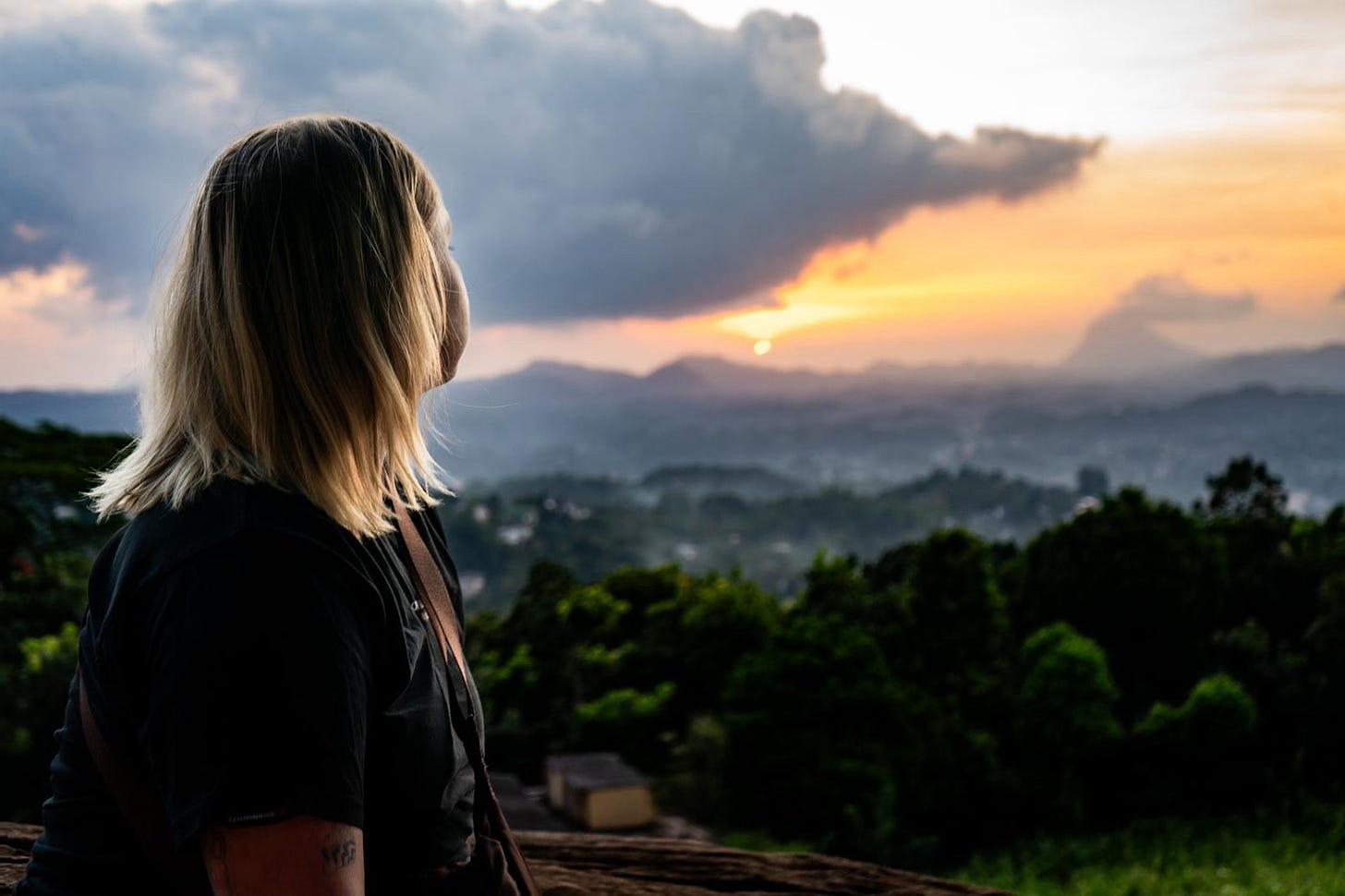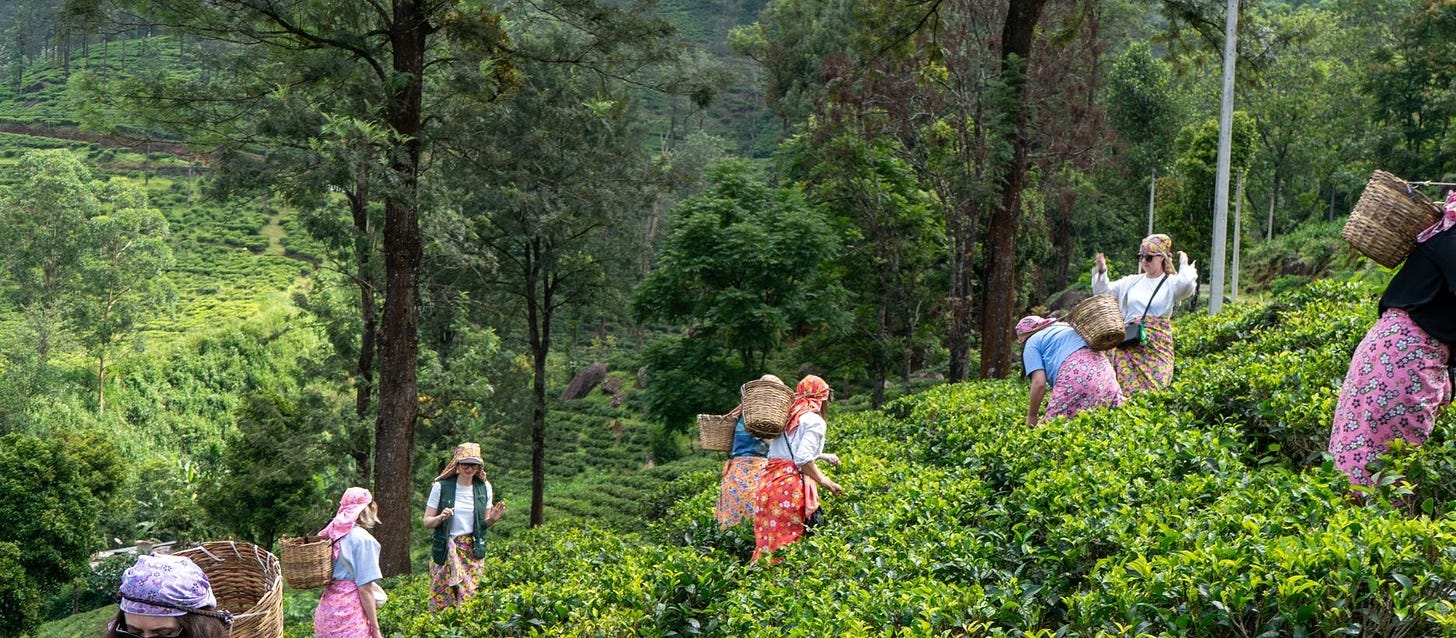The Sri Lanka Diaries: Elections, reflections and tea plantations (Part 1)
Introducing Publicly Serving whilst travelling through Sri Lanka, and how the first election since the 'Aragalaya' could shape the future of this country.
It’s been 15 years since Sri Lanka’s bloody civil war came to an end - but has Sri Lanka reckoned with a past marred by conflict? Most importantly, will the first election since the public ousted a sitting president result in the social and economic reform Sri Lanka is crying out for?
Welcome to Publicly Serving - a publication from the desk of a nerdy Australian civil servant who wants to make politics and public policy easy and interesting to read and engage with. Whilst Melbourne/Naarm has my heart, travelling Sri Lanka over the last ten days and reading the works of Sri Lankan authors and activists had me thinking. How do we, regular everyday people, understand and connect with the places we visit and the decisions that shape the daily lives of the people who live there?
So here we have it - the first edition of an experimental newsletter where I can share the things that interest me with you (who ever you are - probably my Mum).
Two days before voting opened for the Sri Lankan presidential election, I found myself riding a bus with a group of strangers who had become friends. The bustling streets of Kandy, the anglicised version of the Sinhala Kanda Uda Rata - the land in the mountain - became the winding roads of the Hathana mountain range.
Travelling with a tour company has its perks - not thinking about where you’re sleeping at the end of the day, not worrying about where to find the best Kottu, and being taken through every experience by a local tour guide who knows their stuff.
It’s a privilege to travel and have the financial stability for experiences like this - something I don’t take lightly. Especially in a place like Sri Lanka, where rising inflation, cost-of-living and poverty are headline issues for this election.
Sri Lankan politicians contest for tea plantation worker votes
As we trekked south towards Tissamaharama, we stopped for a tour of a tea plantation. I drink enough tea that I might as well just hook myself up to an English Breakfast IV drip, so my interest peaked.
Mechanical contraptions whirred, a group of women monitored withering troughs, and the moisture content of tea leaves reduced before our eyes. Our host guided us through types of tea and uses of the leaves, and a familiar, earthy smell followed us around the factory.
It wasn’t until I re-boarded the bus, $60 worth of tea tucked into my backpack, that I found this Associated Press article about the critical role of tea plantation worker votes, and the conditions they live in.
In a workforce that is predominately women, tea plantation workers have long advocated for better living and working conditions. What Sri Lankan’s presidential candidates have learnt, is that securing the votes of tea plantation workers - who make up some 400,000 people - could swing an election.
The thing is - meeting election promises is a critical aspect of building public trust. Putting your public money where your public mouth is. If a government can’t follow through with what they promise - it has consequences: eroded civic engagement and increased public dissent.
Tea plantation workers increasingly feel the repetitive nature of election promises - but can the presidential candidates follow through?
The Sri Lankan Elections: Polls have closed, but what comes next?
Watching the sun rise over Tissa Lake, my bunk buddy Em snoozed on the bed beside me. I flicked mindlessly through phone notifications, and one news alert stood out - a curfew imposed by the Sri Lankan government had been extended until 12pm today.
Despite what is being called Sri Lanka’s most peaceful election in the few, local articles I could find - it’s the first election since a youth-led, anti-government protest ousted popular President Gotabaya Rajapaksa on 13 July 2022 - resulting in him fleeing the country.
A series of mass protests that started in March 2022, the Aragalaya - Sinhala for ‘Struggle’ - was a response to soaring inflation, limited access to some foods and medicines, and energy black-outs across the country.
Presidential candidates now vying for the top spot are pushing hard on election promises relating to economic reform - and whilst I’m still learning about a country so different to my home, the key rhetoric I’ve heard as a tourist is either a) they’re all the same and corruption will never end or b) a change in leadership will bring more tourists to the country. Or on occassion, c) a very quick topic change.
The trishaw drivers, market stall operators and tea plantation workers of the country are all individual people with individual opinions, of course. However - they also each have a part to play in how a country like Sri Lanka progresses. If community on the ground wants change, and as the Aragalaya shows, are willing to fight for it - will a new leader take tangible steps to do so?
In trying to find an article that explains the public sentiment and candidates well - this New York Times article is a great intro piece. Announcements are yet to be made about the outcome of the vote count.
Reflecting on the post-conflict years
As I finish this first piece, our tour bus glides towards Galle on an empty freeway. To go from roads thick with traffic, to - nothing. Na-da, zilch, zero, not a single other car passing in either direction. With Sri Lanka’s election curfew still in place, it feels almost apocalyptic.
Post-conflict politics, particularly in a post-conflict climate like Sri Lanka, are difficult - being patriotic or nationalistic typically win out, a driving sense of unity and of ‘re-building’ draw the target audience in.
I still don’t know how I will feel about the phrase ‘post-conflict’ - just because a war has reached its conclusion doesn’t necessarily mean the conflict has ended. Especially not a war that lasted 26 years, and where civilian deaths are estimated at anywhere from 40,000 to 100,000 depending on where you look.
There is trauma in conflict, trauma in loss, and trauma in not knowing where you stand in a country reportedly your own - but something that has stood out so starkly in my travels, is how hard it is to see the evidence of the conflict or to hear the stories, unless you search for them.
Sri Lanka has tough censorship laws, including the controversial Online Safety Act which passed the Sri Lankan parliament in January of this year. This has meant that engagement with some topics on the internet, particularly the war and the experiences of Tamil people in Sri Lanka today, is like scouring an empty field for food.
A part of me - very much the early career writer having a crack at a politics newsletter, in a country where freedom of expression is limited - wants to take my time to reflect and process everything I have learnt. In Part 2 of The Sri Lanka Diaries, I hope I can come back with just that.
Thank you for joining me for the first edition of Publicly Serving. If you liked what you read - or I mean, even if you didn’t - share it with someone. Whether you can unite in love or dismay over my writing - it helps me continue to create more.
Until next time
Tiana
*Disclaimer: having a day-job as an Australian public servant means needing to be impartial and unbiased when I write about some topics to ensure the nature of public service can continue to be a trusted aspect of public administration. This blog is entirely my own personal views and opinions, and Publicly Serving is in no way affiliated with a current government agency or department*






Going to send a link to my Sri Lankan friends to see what he says
Beautifully written and very informative. Can’t wait for more